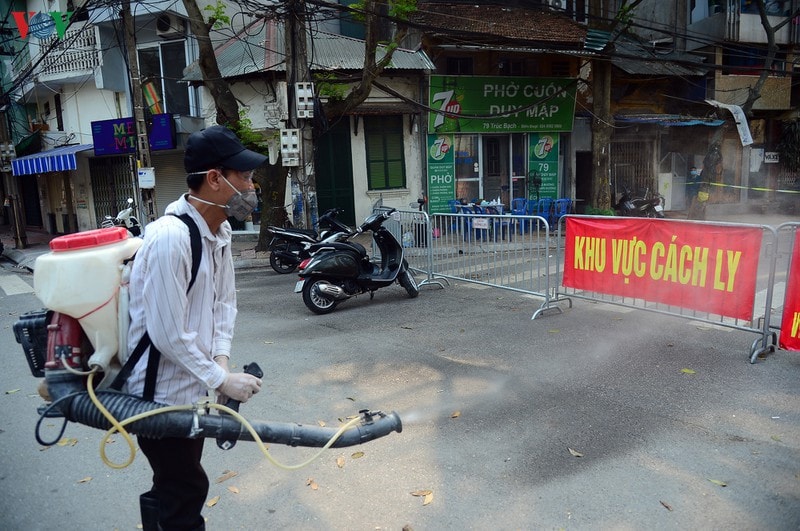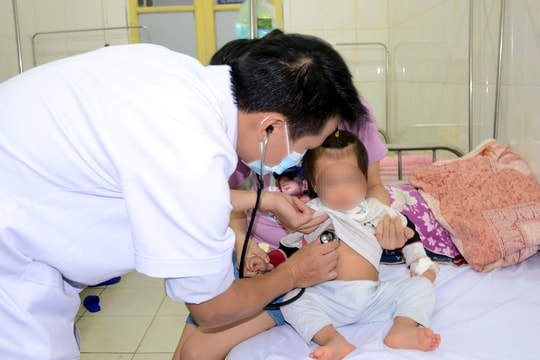Why can suspected F2, F3... cases be quarantined at home?
In cases of home isolation, if infected with Covid-19, the risk of infection to the surrounding environment is very low if there is no close contact.
According to the regulations of the Ministry of Health, Covid-19 cases are considered F0, those who have close contact, direct contact with infected people are called F1. Next, those who have close contact with F1 are called F2, those who have close contact with F2 are F3 and other close contacts are F4, F5,...
Speaking to reporters, Mr. Nguyen Nhat Cam - Director of the Hanoi Center for Disease Control, according to the regulations of the Ministry of Health, when having close contact (talking, eating together,...) with cases of F0, F1, F2, people need to be concerned and must immediately report to the nearest medical facility. For cases of close, direct contact with Covid-19 cases, quarantine is required at a medical facility.
|
Authorities regularly spray disinfectant inside and around the quarantine area. |
Associate Professor, Dr. Tran Dac Phu - Advisor of the Vietnam Public Health Emergency Response Center said that F1, F2, F3 cases have the same risk of infection and are all recommended to report to the nearest medical facility for isolation. However, according to the Ministry of Health's instructions, F2, F3 can proactively isolate and monitor their health at home. At that time, the self-isolation of F2, F3 cases must be monitored by the local health department to ensure that the self-isolated person does not leave the place of residence.
“Every day, medical staff will come to measure health twice. People living in the area are required to limit contact with those in quarantine. Home quarantine and centralized quarantine currently both ensure safety for surrounding areas,” said Mr. Phu.
According to Associate Professor Dr. Tran Dac Phu, in cases of home isolation, even if infected, the risk of infection to the surrounding environment is very low if there is no close contact. Therefore, people do not need to worry when living in areas with F2 and F3 cases who are self-isolating.
“In case there is a case of home quarantine in the residential area, people should stay calm and proactively prevent the epidemic by specific measures such as disinfection, wearing masks, washing hands regularly with soap, etc. Instead of panicking and worrying unnecessarily, people should proactively protect their health. That is the best measure to prevent the epidemic” - Associate Professor Tran Dac Phu said.
According to Mr. Nguyen Dinh Anh - Director of the Department of Communications and Emulation and Rewards (Ministry of Health), every citizen who comes into contact with Covid-19 cases or returns from epidemic areas must declare to the authorities to have measures to isolate and limit the spread of the epidemic in the community. "The policy of disease prevention and control is to proactively prevent, detect early, isolate early, localize and suppress the epidemic. When one individual is infected, we can easily control it, but when many people are infected, the rapid and widespread spread will make the epidemic increasingly difficult to control" - Mr. Nguyen Dinh Anh said.
The Ministry of Health has also issued detailed instructions for home quarantine. Accordingly, the quarantined person should preferably stay in a separate room. In case the family or accommodation does not have a separate room, the quarantined person's bed should be at least 2 meters away from the beds of other family members.
The isolation room should be well-ventilated, regularly cleaned, and have limited furniture and items in the room. The person in isolation should limit leaving their private room and limit direct contact with family members and their place of residence. Measure your body temperature at least twice a day and record it on the monitoring form provided by medical staff. If you have any of the following signs: fever, cough, or difficulty breathing, you should immediately notify medical staff./.





.jpg)
![[Infographics] 5 biện pháp phòng, chống dịch COVID-19 [Infographics] 5 biện pháp phòng, chống dịch COVID-19](https://bna.1cdn.vn/thumbs/540x360/2025/05/22/anh-2.jpg)

-5b8619d675cc4f38cedd8c853332ddab.jpg)
